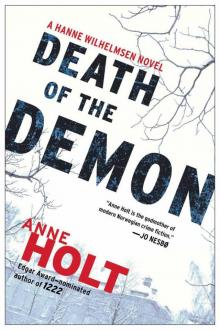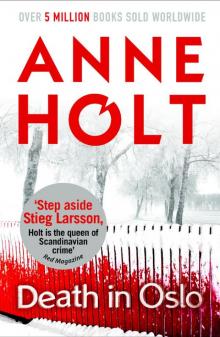Dead Joker Read online
Page 12
“Let’s assume that Ståle Salvesen did take his own life last Monday. Perhaps Halvorsrud was mistaken. He believed … he believes that Ståle Salvesen is the murderer, but actually it was someone else. Someone who looks like him. Either by some odd, ill-fated coincidence, or because—”
“Or because the murderer wanted to look like Salvesen,” Billy T. finished for her, draining the remains of the cola. “Of course we’ve considered that. We still are, for that matter. But why?”
“You spend too much time with Hanne,” Karen said drily. “Besides, you’re the ones who need to find the motive. That’s not my remit. Fortunately.”
“How are the children doing, anyway?” Billy T. asked. “It wasn’t exactly much fun hauling the boy in for an interview, with his mother dead and his father behind bars for God knows how long.”
“The boys are doing fine,” Karen said, wrinkling her brow as if something was needling her. “Thea not so good. According to my brother, who’s an old friend of the family, she’s completely inconsolable. The strange thing is that she seems far more upset about her father being in prison than about her mother’s death. She’s stopped eating. Refuses to go to school. Hardly says a word. Floods of tears and wild rages, and demands to see her father. Wants her father home. Barely mentions her mother.”
“Impossible to predict people’s reactions in such situations,” Billy T. said with a yawn. “Especially youngsters. I have to go. I’ll make sure the folder is supplemented in the fullness of time.”
As he placed his fist on the doorknob, Karen said in an undertone, obviously mainly to herself, “Maybe Håkon—”
Billy T. turned round and gave her a long look.
“Yes,” he said finally. “Maybe Håkon is the one to speak to Hanne. In any case, it’s certainly not me.”
“What is it we really see in her?” Karen Borg asked, still speaking into thin air. “Why are we so fond of Hanne? She’s sulky and … grumpy. Frequently, at least. Introverted and reserved. We’re all at her beck and call. Why is that?”
Billy T. ran his hand over the doorknob.
“Because she’s not always like that. Perhaps we … When she suddenly opens up and … I don’t know. I just know that she’s my best friend.”
“You admire her. Unreservedly. We all do. Her cleverness. That obstinate intellect of hers. But … Why are we so damned vulnerable as far as she is concerned? Why—”
“I care about her. You do too. There isn’t an explanation for everything in this world of ours.”
His voice was suddenly dismissive and brusque, like an echo of Hanne herself. Then he raised his fingers abruptly to his brow and headed off.
28
The time was twenty-five minutes past twelve on March 10, 1999. Karianne Holbeck already had a seven-hour workday behind her and was attempting to massage the back of her neck. When she flexed her arm, she realized that she must have put on more weight. She also noticed it with her jeans – they strained so much that she could no longer sit with her top fly button fastened. It annoyed her no end. On the fourth of January, she had shown great optimism and determination by purchasing a six-month subscription to the local gym, but to date she had only been there once.
The phone rang again.
“Holbeck,” she barked into the receiver.
“Good afternoon. My name is—”
Police Sergeant Karianne Holbeck did not catch the name. Not even part of it. All she picked up was that it had something to do with a foreigner.
“What’s this about?” she said indifferently as she took out the fitness center brochure, making an effort to find out how late in the evening they stayed open.
“I’m phoning about that attorney,” the voice continued. “The one they’re writing about in the newspapers. That guy called Halvorsrud.”
“Halvorsrud,” Holbeck murmured, looking at the clock. “He’s not an attorney. He’s the Chief Public Prosecutor.”
“I’m from Turkey, you understand.”
The man persevered.
“I have a vegetable shop in Grünerløkka.”
The gym stayed open until eight. So there was at least some hope of doing a session there that evening.
“You understand,” the voice on the phone insisted. “Last year, I was reported to the police. Just a piece of nonsense, you know, but they said that I hadn’t paid my tax properly. Something wrong with the accounts as well, they said. Then I got a phone call from Halvorsrud. He could help me, he said. He would meet me one evening. He would talk to me about how much it would cost to put … to put my affairs in order, he said. I didn’t completely understand. My wife, she said no.”
Karianne Holbeck’s interest had increased dramatically. She hunted desperately for a pen, without success.
“Did he say that he was the person on the phone? Did he introduce himself as Sigurd Halvorsrud?”
“Yes, that was what he said. He didn’t say what he was, an attorney or anything, but I wrote down the name. I have the piece of paper here.”
Karianne Holbeck cleared her throat, angrily pulling out drawer after drawer to find something to write with. No luck.
“I don’t know if this is something for the police, but I thought I—”
“Can you come here?” Holbeck interrupted him. “I’d like to speak to you in person.”
She glanced at the Donald Duck clock that was threatening to fall off the desk. “Two o’clock?”
“No, I’m really, really busy now. I can come on Monday. Monday at ten, for instance. I can come and ask for—”
“Holbeck,” Karianne said too distinctly, as if speaking to someone hard of hearing. “Ka-ri-an-ne Hol-beck. But wait a moment …”
She put down the receiver and stormed out to the front office in search of a writing implement.
“Hello,” she said breathlessly into the phone when she returned. “Are you there?”
He was not. All she could hear was a nerve-racking, monotonous engaged signal. She pressed the button desperately, but the line was still completely dead.
“Bloody foreigner,” she spluttered, dangling the handset.
Then she slapped her hand over her mouth, hoping to God that no one had heard her through the open door on to the corridor.
All she could do was hope that the man would in fact turn up on Monday, which was far from certain. Karianne Holbeck had long experience of foreigners who were thoroughly unreliable. She was in no way racist. As far as she was concerned, all people were equal. The problem was simply that Turks and Iranians, Pakistanis and North Africans, Vietnamese and Latin Americans could not be depended upon. Monday or Tuesday, at one o’clock or five, it was impossible to say whether the guy would make contact at all.
Karianne Holbeck could not even remember what sort of shop the guy ran. She thought she had heard the name Grünerløkka, but she was not sure. He was definitely Turkish. As if that was any help.
“This is what happens when my workday begins at half past six,” she muttered in irritation, realizing that she had committed a blunder of enormous proportions.
29
It suddenly dawned on Eivind Torsvik that he had not used his voice for a fortnight. It was almost as if he had forgotten what it sounded like. He stretched out on the settee and tried to concentrate on remembering what tone it had. He knew he sounded younger than his years. His intonation was clear and melodious, with a touch of something outlandish that could give the false impression he was not actually Norwegian. A teacher at elementary school had once come across him when as a young boy he had broken into the gymnasium to spend the night there. Eivind was singing old Eagles songs in an effort to stave off his fear. The teacher had been dumbstruck, and Eivind suspected he had stood there listening for some time before he finally stepped out of the shadows. The man had said something about Eivind being exceptionally musical. He was probably just trying to be friendly. But the boy had stood up and taken to his heels. Now, when he cast his mind back and tried to recall what he h
ad done afterward, he could not remember. Since that night, he hadn’t sung a single note.
It was pleasant lying there like that.
He dozed off into a peculiar state somewhere between sleep and wakefulness. Of course, he could have just gone ahead and said something. But that would be too easy. The motes dancing behind his eyelids gathered slowly into a central red point. There. That was it. He spoke slowly and distinctly. “Now it’s coming together nicely. Soon we’ll have them.”
His voice was exactly as he remembered it. Clear and a tad childish, it fitted the nickname he had been given in prison very well.
“I am the Angel,” Eivind Torsvik said with satisfaction, before falling fast asleep.
30
“My goodness,” Håkon Sand said, “you’re here?”
He found himself looking at his watch. It was almost midnight. He could not understand what Police Chief Hans Christian Mykland was doing outside the low-rise brick apartment block in Lille Tøyen where Hanne and Cecilie lived. Even less so at this time of night.
“You’re looking good,” the Police Chief said cheerfully, clapping Public Prosecutor Håkon Sand affably on the shoulder. “Are you being well looked after over there in Hambros plass?”
Håkon mumbled dismissively. He really had no idea why the Police Chief was there. He stuck a finger in his ear and scratched frantically.
“I thought I should pay a visit to our mutual friend,” Mykland said, tossing his head in the direction of the second-floor window. “Just wondering how she’s getting on.”
The joviality suddenly vanished. In the dim light from a streetlamp in the driveway, Håkon Sand noticed a concern on the Police Chief’s face that he could not interpret. The man looked older than Håkon thought he was. It could have been because of the grayish-yellow semi-darkness, or even the shabby beige parka.
“Do you know each other?” he blurted out. “I mean … Do you know Hanne socially?”
The Police Chief smiled, shaking his head only slightly.
“That would be something of an exaggeration. I’m just concerned. She isn’t having an easy time at the moment. But …” He shrugged and gave a broad smile. “… now that you’re here, Hanne’s in capable hands. I’ll go. Good night.”
Håkon murmured some kind of goodbye and stood watching the Police Chief as he jogged the twenty or thirty meters across to an old yellow Saab. The car protested noisily but after two explosive bangs from the exhaust it moved reluctantly uphill, leaving a trail of coal-black smoke. Håkon gave a deep sigh as he rang the entry phone.
No one answered.
He rang again, for so long that he began to feel impolite. So he took his finger off the button, stepped back three paces, and peered up at the kitchen window on the second floor. Behind the curtains the ceiling light was on. Apart from that, the apartment block was in total darkness, except for a light someone had forgotten to switch off in the basement. A rectangular window shed a cold-blue light on his feet.
She was at home. Håkon was sure of that. He had called the hospital. A friendly nurse had confirmed that Hanne Wilhelmsen had left a sleeping Cecilie Vibe around eleven o’clock.
“For fuck’s sake, Hanne.”
Angrily, he pressed the doorbell, this time going beyond what could be considered good manners. He kept his finger on the button for what seemed an eternity, and was just about to concede defeat when the lock suddenly buzzed. He tugged at the door and found it open.
He didn’t really understand why he was feeling so anxious. His heart was pounding in a way he had not experienced since he had prosecuted his first case in the Supreme Court. When he opened his palms, he could see the perspiration glistening on his lifelines. Håkon Sand did not know what it was he feared.
Hanne Wilhelmsen was an old, good friend. He could not quite grasp why he felt terrified as he approached the door with its brass plaque: “HW & CV”.
Matters did not improve when she opened the door.
Her face was so tear-stained she was unrecognizable. Her eyes were two narrow lines in all the puffiness, and her lower lip was trembling so ferociously that Håkon could not focus on anything else. He stared at a drop of spittle that quivered on a painful-looking crack in the middle of Hanne’s lip; now it let go and ran down the dimple on her chin. Her cheeks were flushed and it looked as though her entire frame had shrunk. Her hands were hanging lifelessly by her thighs, and her shoulders disappeared altogether inside her far too large college sweater.
He could not think of anything to say. Instead he sat down on the stairs. The concrete step was icy cold through the seat of his trousers. He rubbed his hands together, no longer able to face looking at Hanne.
“Come in,” she said finally, in a voice he had never heard before.
He stood up clumsily, breathless, and lingered in the hallway without removing his jacket, even though Hanne had disappeared into the living room.
The apartment smelled of Cecilie. The scent of Boss Woman filled the air. He sniffed the room. The fragrance was unmistakable. Conspicuous, too. Then he spotted an almost empty bottle on the hall table. He stepped hesitantly in the direction of the living room. The perfume was even stronger in there.
“You’ve emptied the bottle,” he said, biting his lip.
Hanne did not reply. She sat erect in an armchair, without reclining against the back. Her hands were on her lap, open, as if expecting a gift. She was staring at something so intently that Håkon peered to see what it was. A blank, white wall.
At last he wriggled out of his heavy jacket and left it lying at his feet. Then he crossed the room slowly and sat down on the settee. Absent-mindedly he picked up an orange from the fruit bowl and sat juggling it from one hand to the other.
“How did it go?” he finally managed to say.
“Game over,” Hanne said unequivocally. “Metastasis in the liver. Nothing can be done.”
The orange split open. Lukewarm juice ran down Håkon’s hands and dripped huge stains onto his trouser leg. Setting aside the abused piece of fruit, he held his sticky hands helplessly above his knees and burst into tears.
At long last Hanne shifted her gaze.
She looked at him. When he straightened his back to take a breath, he turned his face to hers.
“You’ll have to leave,” she said. “I want you to go.”
He made an unrestrained effort to laugh, and struggled to catch his breath as snot and tears ran down his face.
“I’m crying,” he sniffed as he wiped his face with his sleeve. “I’m crying for Cecilie. But most of all I’m crying for you. You must be feeling bloody worse than I can even imagine. You’re being an idiot, Hanne, and I can’t understand—”
The rest was lost in a coughing fit.
“You need to go home to your family,” Hanne said, brushing the hair from her forehead with a stiff, slow movement of her right hand. “It’s late.”
He momentarily gazed at her in disbelief, before getting resolutely to his feet. He bumped his knee on the edge of the table and swore vehemently.
“Yes, I should,” he screamed in a falsetto. “Yes, I should go home now. You just sit there. Just refuse to speak to me. Do whatever the fuck you want! But I’m not going. I’m staying here.”
For want of something better to do, he pulled the sleeves of his sweater up and down in a rage. He sobbed like an overgrown child, and got stinging juice in his eyes when he attempted to literally hold back his tears.
“Bloody hell, Hanne! What is it that’s happened to you?”
Later he had difficulty explaining what came next. He certainly didn’t understand it at the time. It all came as such a surprise that, whenever he tried to talk about it over the next few days, he struggled to describe how she had actually behaved. It was all so illogical, so unexpected and so unlike Hanne Wilhelmsen that he kept thinking he must have dreamed it. Only when he later touched his tender breastbone did he acknowledge that she had in fact attacked him.
She rose from her
chair, stepped nearer to him and delivered a forceful slap to his ear. Then she punched him in the belly with a clenched fist and, sinking onto her knees, hammered away at his legs. Finally, she lay down with her head between her knees and her hands folded around her neck.
“Hanne,” he whispered, crouching down. “Hanne. Let me help you a little.”
Unresisting, she let him pull her up. She allowed his arms to hold her. Her head fell onto his shoulder. He was aware of a powerful whiff of Cecilie and suddenly realized she had emptied the perfume bottle over herself.
Håkon had no idea how long they stood there. All he could do was hold her. Gradually she grew heavier. Eventually he realized that she had fallen asleep. Carefully he let one arm slide around her waist. Like a sleepwalker, she accompanied him to the bedroom, where she lay on her stomach, fully clothed. He stayed listening to her breathing while struggling to make his own follow the same rhythm. Then he lay down quietly beside her, tucked a quilt around each of them, and closed his eyes.
“I’m scared for myself.”
Håkon Sand woke with a start and felt a stab of alarm before recalling where he was. Hanne was lying in the same position as when she had gone to bed, on her stomach with her arms by her sides and her face averted. The quilt was lying on the floor beside her.
“I feel trapped inside what was once myself. Inside everything I have done. Inside everything I regret.”
Håkon coughed feebly, propping himself up with his left arm and resting his face on his hand. His right hand was lying on the small of her back. He made tentative circling caresses.
“It’s as if I want to escape from myself. It’s as if I’m trying to run from …” She sighed and gasped for breath. “… run from my own shadow. It’s impossible. I want to erase everything and start all over again. Now it’s too late. It’s been too late for years.”
She sniffed faintly and turned on to her side, with her back to him. He was unsure whether it was an attempt to move his hand away. Still he said nothing. The room was stuffy and stale, and in the crack of light from underneath the door he saw the specks of dust dancing. In the far distance he heard a motorcycle double-shift. Then everything was quiet again, and he closed his eyes. All of a sudden, Hanne continued.

 A Grave for Two
A Grave for Two Dead Joker
Dead Joker Death of the Demon: A Hanne Wilhelmsen Novel
Death of the Demon: A Hanne Wilhelmsen Novel Punishment aka What Is Mine
Punishment aka What Is Mine Beyond the Truth
Beyond the Truth Death in Oslo
Death in Oslo The Blind Goddess
The Blind Goddess What Never Happens
What Never Happens 1222
1222 In Dust and Ashes
In Dust and Ashes Odd Numbers
Odd Numbers What is Mine
What is Mine What Dark Clouds Hide
What Dark Clouds Hide Blessed Are Those Who Thirst
Blessed Are Those Who Thirst Fear Not
Fear Not No Echo
No Echo Hanne Wilhelmsen - 01 - The Blind Goddess
Hanne Wilhelmsen - 01 - The Blind Goddess